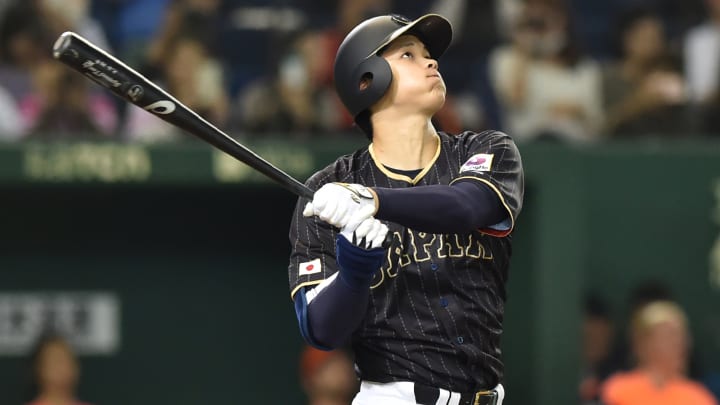Japanese Megastar Shohei Otani Reportedly Coming to MLB Next Season

Shohei Otani, the most heralded prospect to come out of Japan in years, will be posted by his team and come to MLB this winter, according to reports in Japan.
Otani, 23, has put up pitching numbers akin to Clayton Kershaw and hit like Mike Trout against near MLB-level talent in Japan. Last season with the Nippon-Ham Fighters he hit .322 with 22 home runs and 67 RBIs in just 104 games and had a 1.86 ERA and 174 strikeouts in only 140 innings. It’s easy to see why he’s commonly referred to as the Japanese Babe Ruth.
Injuries to his ankle and thigh kept Otani out for two months early this season and kept him off the mound for a stretch in July and August. He still mashed at the plate, though, hitting .346 with seven homers and 28 RBIs in 51 games thus far.
Otani pitched 5 2/3 scoreless innings on Tuesday in just his third start of the year, showing off his impressive fastball (that averages 96 mph) and devastating slider.
打者を惑わす魔球!北海道日本ハム(@FightersPR)・大谷選手の切れ味鋭いスライダー全球をまとめました! #lovefighters pic.twitter.com/KqPFgBfvnk
— パ・リーグ.com / パーソル パ・リーグTV【公式】 (@PacificleagueTV) September 12, 2017
Shohei Ohtani—Japan's Babe Ruth—is About to Change the Face of Baseball
But Otani’s move to North America will be complicated by MLB’s new collective bargaining agreement, as Yahoo’s Jeff Passan spells out neatly. Under the old rules, Otani would have been considered a free agent at age 23 and free to sign a contract worth hundreds of millions of dollars. Under the new CBA, though, international players under 25 are subject to the bonus pool system, meaning Otani will only be allowed to sign a minor league contract with a maximum signing bonus of about $10 million. Further complicating things is the fact that only a handful of teams have enough bonus money available to offer Otani.
But by all accounts, Otani doesn’t care much about money. Here’s what SI’s Jon Wertheim wrote in an April profile:
“As long as I have enough money to be able to play baseball and am enjoying baseball,” [Otani] says, “that’s all I’m asking for right now.” This is more than lip service: Ohtani is not exactly Babe Ruth’s equal in the Department of Sybaritic Living. Fighters sources say that Ohtani spends virtually nothing, lodging at the drab team dorms and reportedly living on less than the $1,000 a month his parents send him from his earnings. He takes team-subsidized cabs to games. He seems to spend mostly on fitness books and workout equipment. Depending on the sponsor that night, the Fighter Player of the Game will sometimes receive free bags of rice or salmon steaks or stalks of asparagus; Ohtani will happily take them, figuring it’s one less run to the grocery store.
Once Otani is in the majors, he’d be subject to the same service time rules as any other player—three years earning the minimum salary followed by three years in the arbitration system. There is also the question of whether a team would attempt to circumvent the system by offering him a wealthy contract extension shortly after his arrival. “One official said precedent will matter, and any contract that doesn’t have a forebear will be considered a violation,” Passan reports.
At any price, if he performs like he has in Japan, Otani will be a bargain.
